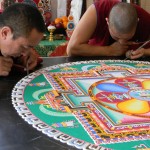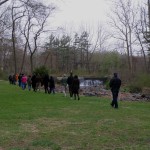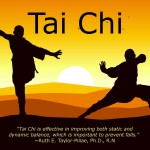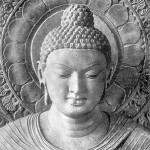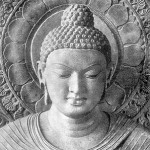An excerpt from Daily Life is Practice,
by Sylvia Boorstein, in Shambhala Sun, July 2015
All the moments of your day are teachings. If you look at them clearly, you’ll see the same fundamental truths the Buddha did.
Think back to the image of the Buddha. Under siege from external events and his internal responses, he preserved his peace of mind with alert steadiness and unshakeable goodwill. Following his enlightenment, the training path the he prescribed for developing those capacities is a summary of lifestyle choices and mind training that we can undertake as well. It is called the eightfold path of practices:
Wise Action, wise speech and wise livelihood specifically pertain to being engaged in the world. The Buddha is said to have counseled his son, Rahula, “Before (or during or after) doing or saying anything, you should consider if what you just said or did is good for yourself as well as good for everyone else.”
All our actions, even our choice of livelihood, should meet the criteria of kind intent. Committing to that intent involves wise mindfulness, the precision in the mind to notice the motives that precede actions, and wise concentration, the steadiness in the mind that makes it less likely to become confused.
Wise effort is the resolve, at every choice-point, word, or deed, to discern and choose wholesome actions. Wise understanding is our deepening conviction that peace of
mind, and the natural goodwill and compassion that grows from it, depends on wholesome choices. Wise intention is our ever-renewing dedication to all the practices that promote these wholesome choices.
Beginning dharma students often ask me, “How will I take this practice out into the world?” I say that it is important to set aside some time every day to sit quietly, or have a quiet walk, specifically to encourage the mind to relax. Just taking “time off”, in whatever healthful way works for you and your schedule, removes the uncomfortable sense of imperative that is likely to arise in a day crowded with tasks. The main thing I want to share, though, is this:
Daily life is practice. Because life in the world is as complex as it is, it is the optimal setting for developing the capacity of equanimity and the habit of benevolence. The techniques that we learn in classes and retreats are techniques for living life.
The Buddha began his spiritual quest hoping to discover the answer to the suffering of regular people. He did and we are the beneficiaries of his example. For now we know that we too can wake up to the unconscious habits of our minds and transform them, through wisdom, into compassion.

 Meditation is great, and it’s really great when you do it regularly, and it’s amazing when you do it with others since you are practicing as a sangha. The sangha that meets Monday nights at Yardley is not the only place that you can practice meditation with a group.
Meditation is great, and it’s really great when you do it regularly, and it’s amazing when you do it with others since you are practicing as a sangha. The sangha that meets Monday nights at Yardley is not the only place that you can practice meditation with a group.